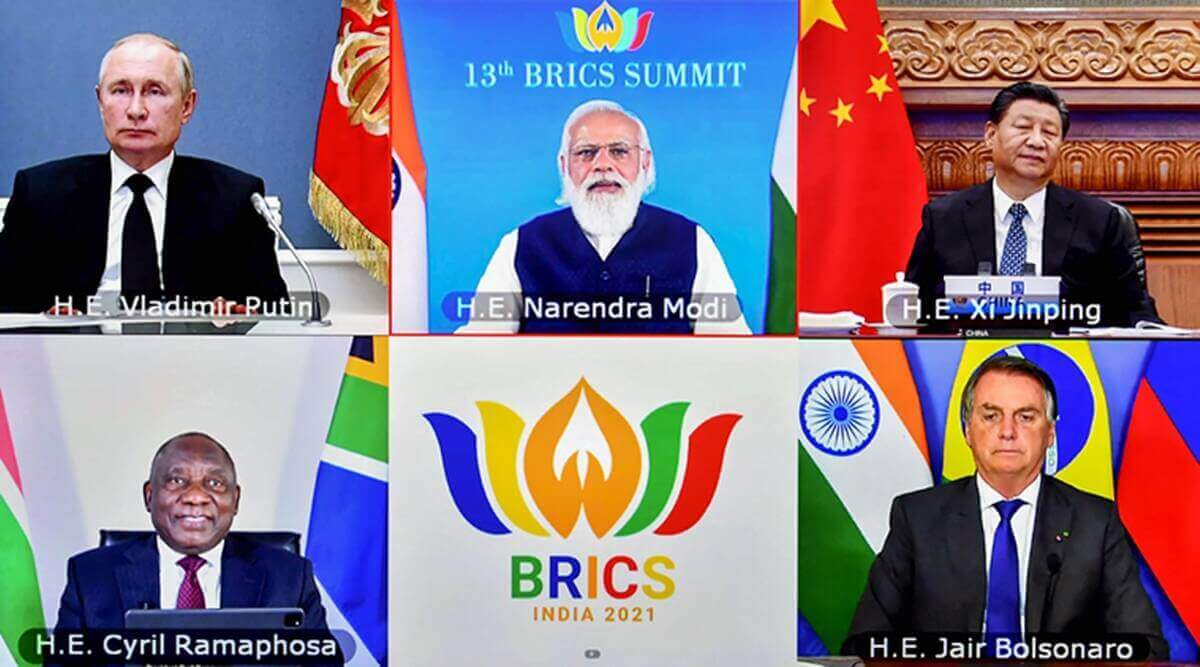On Thursday, Indian Prime Minister (PM) Narendra Modi hosted the 13th BRICS Summit and was joined by his counterparts from Brazil, Russia, China, and South Africa. Here are the major takeaways from each of their addresses:
India
PM Narendra Modi hailed BRICS for its progress in becoming one of the foremost voices of “emerging economies of the world.” He pointed to various BRICS initiatives during the 15 years of its existence, including the New Development Bank, the Contingency Reserve Arrangement, and the Energy Research Cooperation Platform. Keeping this in mind, he said that India’s agenda going forward would focus on cooperation, continuity, consolidation, and consensus, positing that this would ensure that BRICS is even “more productive in the next 15 years.”
The Indian leader also touched on the resilience of the grouping during the ongoing pandemic, highlighting that over 150 BRICS meetings and events have been held this year alone, with 20 of them at the ministerial level.
Speaking of how the grouping has adopted a series of firsts in the recent past, Modi celebrated the fact that in November, the water resources ministers of BRICS member states will meet together for the first time. The Indian PM also talked about the adoption of the BRICS Counterterrorism Action Plan and how members have for the first time “taken a collective position on strengthening and reforming multilateral systems.” He further spoke about their COVID-19 vaccine initiative and the BRICS Alliance for Green Tourism.
China
Celebrating the 15th year of BRICS, President Xi Jinping said that member states have over the years “enhanced strategic cooperation and political trust” as well as the “spirit of openness, inclusiveness, and equality.” In what could be interpreted as a veiled criticism of the United States (US), Xi then hailed how members have “respected each other’s social systems and development paths” to build mutually beneficial relationships. He said that these interactions have led to BRICS becoming a “force to be reckoned with” in multilateralism and global governance.
South Africa
President Cyril Ramaphosa used yet another multilateral platform to call for “equal access to COVID-19 vaccines, diagnostics, and therapeutics.” He also asked other member states to join South Africa and India’s call for a TRIPS waiver at the World Trade Organization on COVID-19 vaccines in order to “ensure a rapid expansion of COVID-19 vaccine production across the world.” Expanding on the topic of health, he welcomed the decision of members’ health ministers to launch the virtual BRICS Vaccine Research and Development Centre.
Ramaphosa also lent his support to “representative multilateralism,” pointing to the joint statement issued by BRICS foreign ministers back in June on “Strengthening and Reforming the Multilateral System.” To this end, he called for the reform of the United Nations Security Council to “enable Africa to take its rightful place among the collective of nations in this crucial body.”
The South African leader also spoke about being in the final decade in terms of meeting Sustainable Development Goals and said BRICS members must remain jointly focused on pursuing “quality education, decent work, climate action, peace, and justice.”
Brazil
President Jair Bolsonaro spoke in glowing terms of Brazil’s strategic partnership with India, saying that “several” agreements signed during his visit to India in January 2020 are now “bearing fruit,” particularly in the fields of science and technology, energy and healthcare, and bilateral trade.
There has been a spate of scandals in Bolsonaro’s administration recently regarding China, with several ministers and the president himself questioning the efficacy of the Chinese COVID-19 vaccines and arguing that China is to blame for the spread of the virus. Therefore, Bolsonaro used the summit to stress that ties between Brazil and China remain “healthy,” particularly in terms of trade and investment. He also emphasised on the fact that a large share of vaccines being used in Brazil were produced in China.
Next, Bolsonaro hailed Brazil’s strategic partnership with South Africa which has led to cooperation in defence, science and technology, the environment, and also trade and investment.
Similarly, the President said Brazil has also developed a “broad-ranging and comprehensive” strategic partnership with Russia. Bolsonaro said ties with Russia are currently centred around agribusiness and thus expressed interest in “diversifying” exports to Russia.
Russia
Putin said that global security as a whole has weakened and that social issues have been “aggravated” by the economic impact of the ongoing pandemic. He argued that “strategic stability has gone downhill” and that regional conflicts have expanded.
The Russian leader spoke about the unfolding situation in Afghanistan following the withdrawal of US and NATO troops and the subsequent capture of the country by the Taliban last month. He called for peace in Afghanistan and called for non-interference, saying that Afghan citizens deserve to determine their own fate. Putin noted, however, that it is crucial to ensure that Afghanistan does not become a hub for spreading instability across the region, particularly through drug trafficking and terrorism. To this end, he called for some restrictions being placed on the flow of migration from Afghanistan.
Putin said that the current “destabilisation and chaos” in Afghanistan is a direct result of US involvement and its measures to build “so-called democracy and democratic structures using the patterns and methods of social and political engineering.” He lamented that the rest of the international community is now having to “clear out the mess” created by the US and its allies.
Keeping this in mind, he called for countries across the globe to peacefully coexist each other’s different political and social systems as well as national interests and moral values. He acknowledged, however, that such interactions must be guided by international law enshrined in the UN Charter, so long as they also hold respect for sovereignty and non-interference in each other’s internal affairs.
He then said that the BRICS is one of the biggest players in promoting the “emerging multipolar system,” which is centred around “independent centres of economic growth and political influence.”

